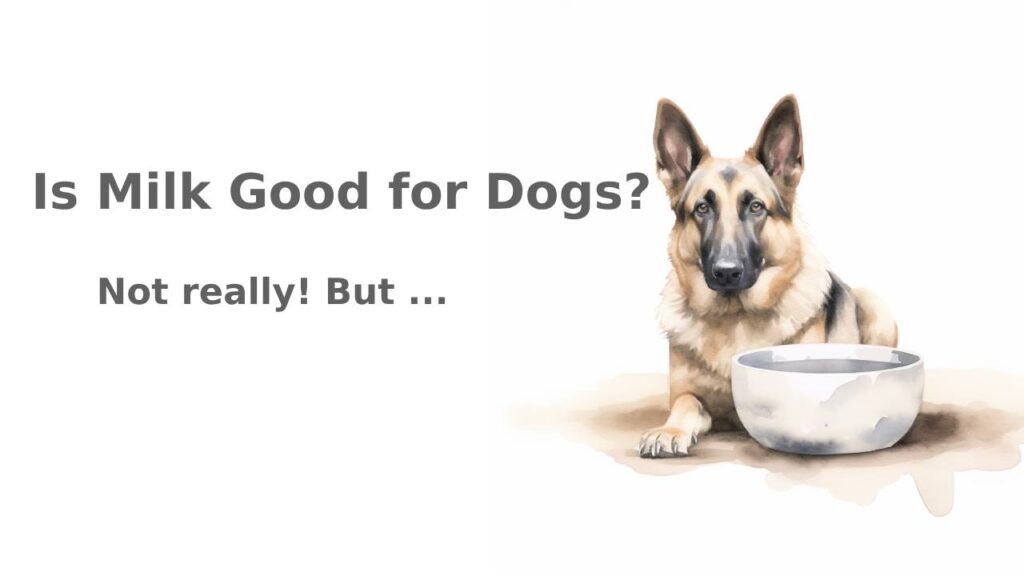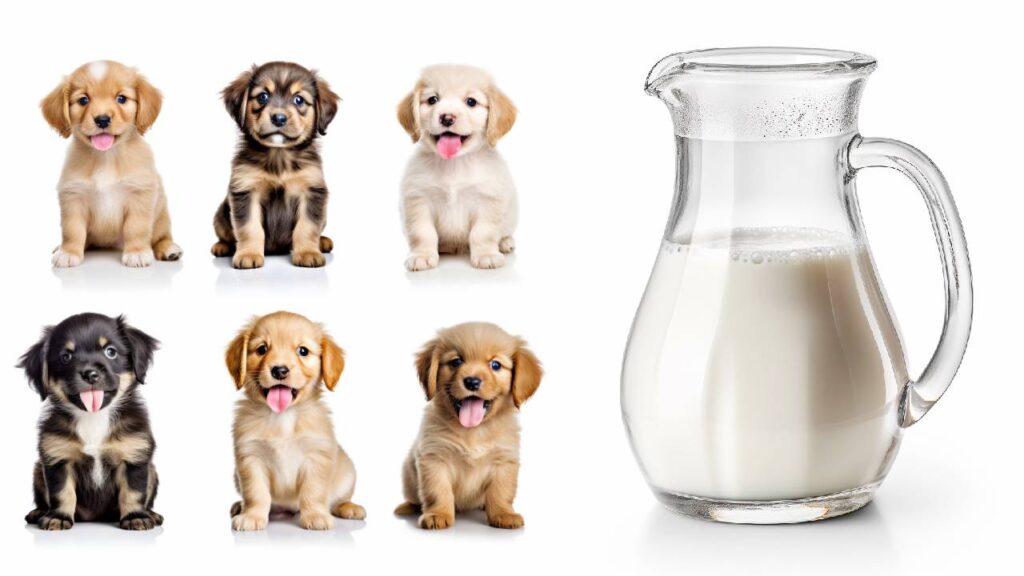Milk is a staple in many human diets around the world. It provides much nutritional value as a rich calcium, protein, and vitamin source. But when it comes to our furry friends, a common query arises: can dogs drink milk? And more specifically, can puppies drink regular milk? Let’s dive deep into this subject to demystify the myths and facts.
Is Milk Good for Dogs?
With its rich and creamy texture, milk has found its way into our diets and morning routines. We relish it with cookies, blend it into smoothies, and use it in countless recipes.
But what about our loyal canine companions? How do they fit into this picture? The reality is more complex than you might think. While it’s tempting to believe that what’s good for us is good for our pets, too, milk doesn’t quite get a gold star when it comes to dog treats. Here’s why: even though dogs might love the taste, it doesn’t necessarily mean it suits their digestive systems or nutritional needs.
Puppies and Milk
When puppies are born, they thrive on their mother’s milk. This isn’t just any milk; it’s a special blend packed with the essential nutrients they need during their earliest days.
Think of it as a superfood shake designed just for them. This canine milk ensures they grow strong, healthy, and vibrant. However, as puppies age and start exploring other foods, their reliance on their mother’s milk diminishes. Transitioning them to cow’s milk can be like switching from a custom-made health drink to a generic store-bought one. It might fill them up but offers different benefits.
Some puppies might struggle to digest cow’s milk, bringing us to lactose.

Adult Dogs and Milk
As dogs grow and mature, they, like humans, undergo various changes. One of these changes relates to their digestive system’s ability to process dairy. Many adult dogs develop a kind of lactose intolerance. Now, picture a friend or family member who can’t handle dairy — they might experience discomfort, bloating, or even an upset stomach after consuming it. For dogs, it’s a similar story. Drinking milk can lead to digestive disturbances, making them feel uncomfortable or ill. So, while they might lap it up excitedly, the after-effects might not be as pleasant.
Why Is Milk a Problem for Some Dogs?
Just as humans have foods that don’t agree with us, dogs have their culinary no-nos. While some humans might swear off spicy foods or skip that cheese platter, for many dogs, cow’s milk can be the culprit causing discomfort. The main reason? A pesky little component called lactose.
Lactose and Its Complexities:
Lactose is a sugar found abundantly in milk. It might sound innocent enough, but to properly digest it, bodies (human or canine) require lactase. As puppies, most dogs produce plenty of lactase to help digest their mother’s milk.
However, as they grow older, the production of this enzyme may decrease, making it harder for them to digest lactose found in cow’s milk. The result? Potential digestive upset can leave your furry friend feeling less than their best. Symptoms can range from mild discomfort to more noticeable issues like diarrhea or bloating.
Is Cow’s Milk Meant for Dogs?
When we think of milk, many of us automatically think of cows. However, in its natural composition, cow’s milk is tailor-made for calves. It has specific nutrients, fats, and proteins to help a baby cow grow big and strong.
When we offer this to our dogs, it’s like trying to use diesel in a gasoline car; it’s just not the right fit. This mismatch in nutritional profiles means that while your dog might enjoy the taste, they need the nutrients best suited for their unique needs. Over time, this could lead to nutritional imbalances or deficiencies.
Alternatives to Regular Milk
Seeing their fur baby enjoy a treat is pure joy for many dog parents. If you’ve been thinking about introducing a milky treat but are wary of the usual cow’s milk, options are available. Here are some alternatives that might be gentler on your pup’s tummy:
Lactose-Free Milk: The Best of Both Worlds
Lactose-free milk is regular milk with the lactose content removed or broken down. This means your dog can still relish the creamy goodness of milk without the troubling sugar. It’s made using an enzyme to break down the lactose, making it more digestible for those with sensitivities.
Most supermarkets stock this option nowadays, so it’s a convenient switch. However, like all treats, remember to give it in moderation and always watch for allergies or sensitivities.
Goat’s Milk: Nature’s Gentle Alternative
While cow’s milk dominates the dairy aisles, goat’s milk has been gaining traction as a more digestible alternative. With its smaller fat molecules and slightly different protein structure, many dogs find it easier to process. Plus, it’s often lower in lactose, making it gentler on the stomach. It’s a nutritious and hydrating treat, especially for dogs with sensitivities to cow’s milk.
However, ensure it’s raw and free from additives or preservatives that might harm dogs.

Dog Milk Replacers: Tailor-made for Your Pup
You’ve heard of baby formula for infants, right? Think of dog milk replacers as the canine equivalent. These products are specially formulated to provide the nutrients in a mother dog’s milk, making them a perfect fit for puppies or adult dogs. You can find them at most pet stores, and they’re designed to be easy on the digestive system while providing essential nutrients.
If you’re raising a pup separated from its mother or looking for a nutritious treat, these replacers could be a solid bet.
- Coconut Milk: Made from the flesh of coconuts, this milk is lactose-free and can be a creamy dog treat. Ensure you’re offering an unsweetened version without any additives. However, because of its high-fat content, it’s best given in moderation.
- Rice Milk: Produced from milled rice and water, rice milk is both dairy and lactose-free. It’s a light alternative that’s easy for most dogs to digest. As with other milk, ensure it doesn’t contain added sugars or artificial sweeteners.
- Oat Milk: A favorite among many dairy-free consumers, oat milk is creamy and relatively easy to digest. While safe for dogs in small quantities, ensure the oat milk contains no added sugars or other harmful ingredients.
What If I Can’t Resist Those Puppy Eyes?
We all know those begging eyes are hard to say no to, but it’s essential to remember what’s best for your pet. If you want to give your dog a special treat, try a dog biscuit or a piece of fruit that’s safe for dogs instead of milk.
When In Doubt, Ask the Vet
Your vet knows your dog the best. If you need more clarification about giving your dog milk, why not give them a call? They’ll know what’s best for your furry friend.
Conclusion
Ultimately, milk isn’t the best treat for our dogs, even though they might like the taste. It’s always best to stick with dog food and special treats made just for them. If you have doubts, your vet is just a phone call away. Remember, being a great pet parent is about keeping our pets healthy and happy!

FAQs
Why do some dogs seem to love the taste of milk?
Dogs have taste preferences like humans; many are drawn to creamy textures and flavors. However, enjoying the taste doesn’t mean it suits their digestive system.
Is it safe to give my dog milk?
Your dog can tolerate milk better than others. However, since cow’s milk isn’t formulated for dogs, healthier treatment options might exist. If you haven’t noticed any problems, you can give milk occasionally, but ensure it’s in moderation.
Can lactose intolerance in dogs develop over time, or will they have it from birth?
Dogs are generally born with the ability to digest lactose, but as they grow older, many can become lactose intolerant. It’s similar to humans, where some children might be able to digest milk but develop intolerance as adults.
Are there any signs I should watch to determine if my dog is lactose intolerant?
Answer: Yes. Symptoms of lactose intolerance in dogs include diarrhea, gas, bloating, stomach pain, and frequent scratching. If your dog exhibits these after consuming milk, it’s best to avoid giving them milk in the future.
Is it okay to give milk as a rare treat, like on my dog’s birthday?
If you want to treat your dog, and they have no known lactose intolerance, consider giving a small amount. Just monitor for any adverse reactions. Alternatively, consider lactose-free options or special doggie ice cream in pet stores.
I’ve heard yogurt is better than milk for dogs. Is this true?
Yogurt can be easier for some dogs to digest because it often contains probiotics, beneficial bacteria that aid digestion. However, if you give yogurt, ensure it’s plain without added sugars or artificial sweeteners, especially xylitol, which is toxic to dogs.






I’ve heard that most dogs are lactose intolerant. Our dog had a bad reaction to milk once so now we only give him lactose-free options.
Our pup Milo love a bit of milk as a treat never had issues, but I hear mixed opinions
Our pup loves a bit of milk as a treat. No issues so far
I’ve heard mixed things about giving milk to dogs. What’s your take on it? 🐶🥛